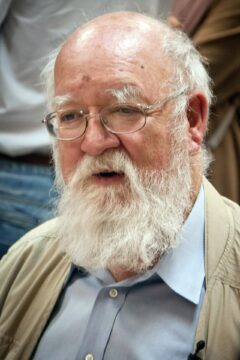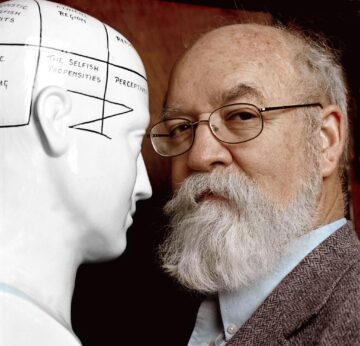The House Slave
The first horn lifts its arm over the dew-lit grass
and in the slave quarters there is a rustling—
children are bundled into aprons, cornbread
and water gourds grabbed, a salt pork breakfast taken.
I watch them driven into the vague before-dawn
while their mistress sleeps like an ivory toothpick
and Massa dreams of asses, rum and slave-funk.
I cannot fall asleep again. At the second horn,
the whip curls across the backs of the laggards—
sometimes my sister’s voice, unmistaken, among them.
“Oh! pray,” she cries. “Oh! pray!” Those days
I lie on my cot, shivering in the early heat,
and as the fields unfold to whiteness,
and they spill like bees among the fat flowers,
I weep. It is not yet daylight.
by Rita Dove
from Selected Poems
W.W. Norton, 1993

 If high intelligence is the ability to hold two opposing ideas in our heads at the same time, then most of us are geniuses about aging a few times over. We think it will never come for us. We think it might come but it will stop before it reaches us. We think it’s coming and there is absolutely nothing we can do about it. It was the great molecular biologist Seymour Benzer who got me interested in the idea that aging might be malleable. Benzer was a night owl. I was writing
If high intelligence is the ability to hold two opposing ideas in our heads at the same time, then most of us are geniuses about aging a few times over. We think it will never come for us. We think it might come but it will stop before it reaches us. We think it’s coming and there is absolutely nothing we can do about it. It was the great molecular biologist Seymour Benzer who got me interested in the idea that aging might be malleable. Benzer was a night owl. I was writing  I just received the very sad news about the passing of Dan Dennett, a lodestar in my life and in many thoughtful people’s lives.
I just received the very sad news about the passing of Dan Dennett, a lodestar in my life and in many thoughtful people’s lives. Most popular accounts of evolution focus on the amazing adaptations of organisms to their environment. But, Dobson counters, “whilst there seems no end to evolution’s artistry, it is all too easy to be blinded by the pyrotechnics on display” (p. 14). To better understand natural selection it is equally instructive to consider what it can not do. Though on paper it is a relentless mechanism to weed out the evolutionary unfit, in practice the process often results in suboptimal adaptations, cumbersome traits, evolutionary dead ends, and runaway selection that in the end is costly to all parties involved.
Most popular accounts of evolution focus on the amazing adaptations of organisms to their environment. But, Dobson counters, “whilst there seems no end to evolution’s artistry, it is all too easy to be blinded by the pyrotechnics on display” (p. 14). To better understand natural selection it is equally instructive to consider what it can not do. Though on paper it is a relentless mechanism to weed out the evolutionary unfit, in practice the process often results in suboptimal adaptations, cumbersome traits, evolutionary dead ends, and runaway selection that in the end is costly to all parties involved. In December, Indian Prime Minister Narendra Modi received a personal request from his friend and political ally, Israeli Prime Minister Benjamin Netanyahu: expedite the supply of Indian construction labor and other migrant workers to Israel. Prior to October 7, Palestinians from the West Bank and Gaza made up the majority of workers in Israel’s construction and agriculture sectors, doing crucial, if invisible, work in the country’s
In December, Indian Prime Minister Narendra Modi received a personal request from his friend and political ally, Israeli Prime Minister Benjamin Netanyahu: expedite the supply of Indian construction labor and other migrant workers to Israel. Prior to October 7, Palestinians from the West Bank and Gaza made up the majority of workers in Israel’s construction and agriculture sectors, doing crucial, if invisible, work in the country’s  The conceit at the heart of Mick Herron’s Slow Horses novels is simple. There is a house in London for misfit spies. When MI5 is unable, for one reason or another, to fire failed employees, it opts to send them there. The exile is permanent, though the losers who suffer it do their best to pretend it isn’t. It’s a win-win for the service, in any case. No one gets sued. HR is pacified. And banishment proves either so unbearably dull and humiliating that the misfit spies voluntarily quit, or they remain there forever, whiling away the hours without hope of redemption. It is said of the souls in Dante’s purgatorio that the unhappiest are happier than the happiest on earth. Conversely, the happiest in Herron’s inferno are unhappier than the unhappiest outside its walls.
The conceit at the heart of Mick Herron’s Slow Horses novels is simple. There is a house in London for misfit spies. When MI5 is unable, for one reason or another, to fire failed employees, it opts to send them there. The exile is permanent, though the losers who suffer it do their best to pretend it isn’t. It’s a win-win for the service, in any case. No one gets sued. HR is pacified. And banishment proves either so unbearably dull and humiliating that the misfit spies voluntarily quit, or they remain there forever, whiling away the hours without hope of redemption. It is said of the souls in Dante’s purgatorio that the unhappiest are happier than the happiest on earth. Conversely, the happiest in Herron’s inferno are unhappier than the unhappiest outside its walls. Comedian
Comedian  I
I Everything Must Go is about how, over the past 200 years, writers and artists have built on this inheritance to create new kinds of non-Christian eschatology. Ever since Lord Byron’s poem
Everything Must Go is about how, over the past 200 years, writers and artists have built on this inheritance to create new kinds of non-Christian eschatology. Ever since Lord Byron’s poem  This week is the 200th anniversary of Lord Byron’s death. The most famous poet of his age (an odd phrase now) died fighting for Greek independence in the marshes of Missolonghi. “Who would write, who had anything better to do?” he once said. There was a strange contest over his body and memory: The lungs and larynx remained in Greece but friends carried the rest back to England, where huge crowds followed the funeral procession. A month after his death, his former editor burned his memoirs, worried they would damage the reputation of a superstar read around the world.
This week is the 200th anniversary of Lord Byron’s death. The most famous poet of his age (an odd phrase now) died fighting for Greek independence in the marshes of Missolonghi. “Who would write, who had anything better to do?” he once said. There was a strange contest over his body and memory: The lungs and larynx remained in Greece but friends carried the rest back to England, where huge crowds followed the funeral procession. A month after his death, his former editor burned his memoirs, worried they would damage the reputation of a superstar read around the world. Daniel C. Dennett, one of the most widely read and debated American philosophers, whose prolific works explored consciousness, free will, religion and evolutionary biology, died on Friday in Portland, Maine. He was 82.
Daniel C. Dennett, one of the most widely read and debated American philosophers, whose prolific works explored consciousness, free will, religion and evolutionary biology, died on Friday in Portland, Maine. He was 82.